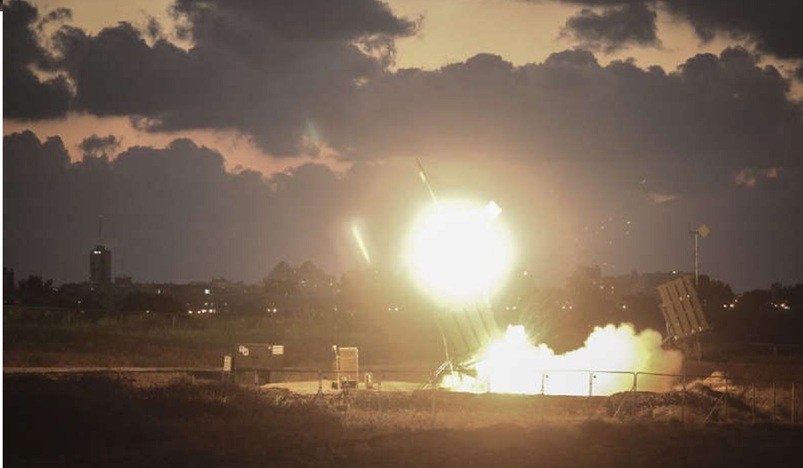
Israel's Iron Dome air defence system fires a missile to intercept a rocket over the city of Ashdod in July 2014.
Israel is expecting to face up to 2,500 rockets a day fired by Lebanon's Hezbollah if conflict breaks out, a senior military official has said.
In May this year, the Israeli Defence Force fought an 11-day war against Palestine, which fired around 4,400 projectiles from the Gaza Strip.
The country says its Iron Dome air defence system, which has been in use for about a decade, intercepted around 90 per cent of the rockets headed for populated areas, with fewer than 300 hitting inhabited districts.
The rate of fire surpassed what was reported during Israel's 2006 war against Hezbollah, when a similar number of rockets were launched from Lebanon over the course of about a month, the Israeli army said.
In May, cities such as Tel Aviv and Ashdod experienced the “highest number of fire towards them in the history of Israel”, said Uri Gordin, chief of the army's Home Front Command.
“We saw a pace of more than 400 rockets fired towards Israel on a daily basis.”
He said in the case of “conflict or a war with Hezbollah, we expect more than five times the number of rockets fired every day from Lebanon to Israel".
“Basically we are looking between 1,500 and 2,500 rockets fired daily towards Israel,” he said.
Set up in 1992 after the first Gulf War, Mr Gordin's Home Front Command is in charge of civil defence, meaning it is responsible for preparing the country in case of threat, conflict or disaster.
Wake-up call
The unit was criticised for its response to the 2006 war with Hezbollah, which killed more than 1,200 Lebanese, mostly civilians, and 160 Israelis, the majority of them soldiers.
The war was a “wake-up call” for the Home Front Command, Mr Gordin said. It has since beefed up its liaison units, which are now active across 250 Israeli municipalities, to provide assistance in case of any attack.
The Home Front Command uses computers to predict a rocket's trajectory after it has been launched. It advises the public within a specific range to head to bomb shelters.
During the Gaza conflict in May, this allowed emergency services to “go to every incident within less than five minutes”, Mr Gordin said from the control room of the unit's headquarters in Ramla, near Tel Aviv.
He said preparations had been made for any incidents on the border with Lebanon.
An Israeli security official said the Israel army hoped for “stability” with its northern neighbour, which is mired in an economic crisis.
Deadly sectarian clashes took place on Thursday in the capital Beirut, leaving seven dead, including Hezbollah members.
Iran-backed Hezbollah was “the source of instability in Lebanon” as it “exploits the state's resources for Iranian interests", the security official said.
Source: The National
.jpg)
Qatar Secures Place Among the World's Top 10 Wealthiest Nations
.jpg)
Hamad International Airport Witnesses Record Increase in Passenger Traffic

Saudi Arabia: Any visa holder can now perform Umrah

What are Qatar's Labour Laws on Annual Leave?
Leave a comment